MercoPress. South Atlantic News Agency
Tag: Royal Navy
-
Sunday, February 13th 2022 - 14:11 UTC
Royal Navy's fifth Astute-class submarine, HMS Anson, completes submerged dive tests
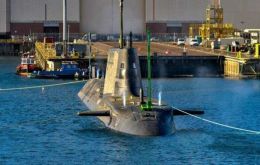
The Royal Navy's next attack submarine is one step closer to entering service after completing a major milestone. HMS Anson was submerged completely in a 'trim dive' at Devonshire Dock in Barrow.
-
Thursday, February 10th 2022 - 09:32 UTC
HMS Protector officer visits “his island” in Antarctica
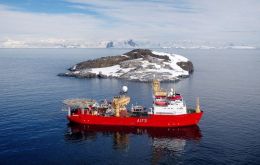
No man is an island – apart from Royal Navy officer Lieutenant Commander Dave Pitt. Currently deployed on survey ship HMS Protector, Lt Cdr Pitt has become possibly the first Pitt to set foot on the Pitt Islands.
-
Thursday, January 20th 2022 - 09:05 UTC
Royal Navy has her first ever female admiral: “someone has to be the first”

The Royal Navy's first-ever female admiral has taken command – smashing a century-old glass ceiling in the service. After 25 years' service, Jude Terry takes the helm as Director of People and Training and Naval Secretary.
-
Saturday, January 15th 2022 - 09:50 UTC
Falklands' War 40th anniversary: HMS Sheffield veterans raising money for a memorial
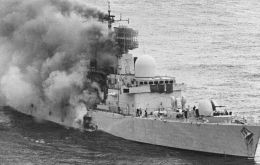
Veterans of the former Royal Navy destroyer HMS Sheffield are looking to raise £15,000 in just a couple of months – in time to install a memorial on the 40th anniversary of her loss during the Falklands war.
-
Saturday, January 15th 2022 - 09:17 UTC
HMS Protector has completed her first Antarctic mission of the season
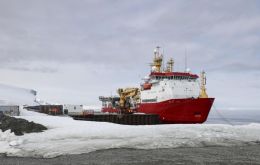
The Royal Navy's only Antarctic research ship has completed her first Antarctic mission of the season – revealing the impact of global warming. HMS Protector is on a five-year mission to support international research into wildlife, the changing climate, and the shifting waters of Antarctica.
-
Monday, January 10th 2022 - 19:46 UTC
Royal Navy frigate underwater sonar struck by Russian submarine
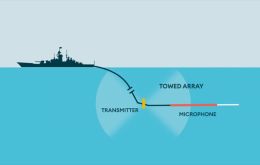
The Royal Navy Type 23 frigate was involved in a collision at sea when a piece of the ship’s underwater tracking equipment came into contact with a Russian submarine, it has been revealed. HMS Northumberland's sonar apparatus was struck while deployed underwater by a vessel it was tracking in the North Atlantic in late 2020.
-
Tuesday, December 28th 2021 - 09:43 UTC
HMS Protector breaks polar record and involved in scientific research on penguins and climate change
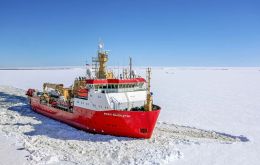
Icebreaker HMS Protector has broken a record, becoming the first Royal Navy ship to enter both polar circles within the same year. The Navy's only icebreaker, Protector left Plymouth in August for Antarctica, – her first visit to the frozen continent since 2019.
-
Tuesday, December 28th 2021 - 09:35 UTC
UK Parliament Defense Committee report, “we're going to need a bigger Navy”

Britain’s parliamentary Defense Committee has fired a broadside at the government, raising significant concerns about the future size and capabilities of the Royal Navy in a report released this month” and reported by Defense News.
-
Thursday, November 11th 2021 - 08:55 UTC
Royal Navy's Type 83 destroyer project will enter concept phase early next year
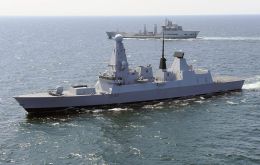
The Royal Navy's Type 83 destroyer project, the replacement for the Type 45, will enter the concept phase early next year, it was announced in Parliament. Minister for Defence Procurement, Jeremy Quin was responding to being asked when the concept and assessment phase for the Type 83 destroyer would formally begin.
-
Monday, November 8th 2021 - 09:14 UTC
Royal Navy Type 21 Association will honor HMS Ardent and HMS Antelope at Falklands' Remembrance Sunday
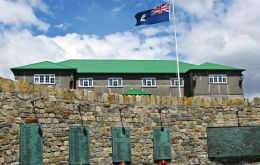
The Royal Navy Type 21 Association will be represented both nationally and internationally on Remembrance Sunday with the laying of poppy wreaths bearing the Type 21 Association Crest in Remembrance of all those that lost their lives whilst serving on Type 21 ships, and all those that lost their lives in the service of their country in war and peace.
